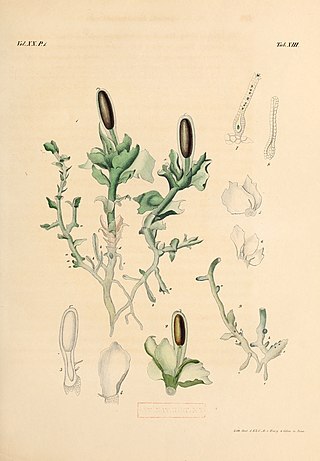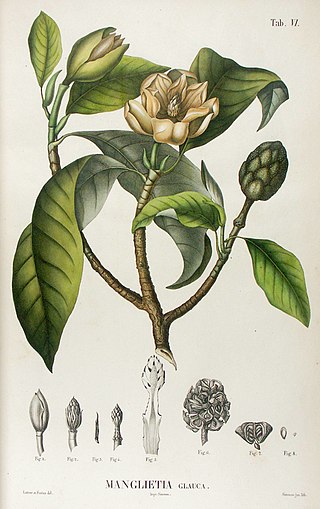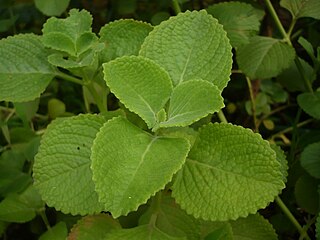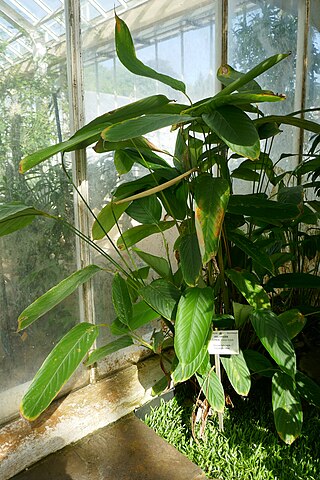
Solenostemon is a former genus of flowering plants in the family Lamiaceae. It has been included in the genus Plectranthus, but is now included in an expanded Coleus. They are native to tropical Africa, Asia and Australia. Some species formerly placed in this genus are cultivated for their highly variegated leaves.

The suling is a musical instrument of the Sundanese people in Indonesia. It is used in the Degung ensemble. Bamboo ring flute can also be found in Southeast Asian, especially in Brunei, Indonesia, Malaysia, the Philippines and Singapore.
The Pospiviroidae are a incertae sedis family of ssRNA viroids with 5 genera and 39 species, including the first viroid to be discovered, PSTVd, which is part of genus Pospiviroid. Their secondary structure is key to their biological activity. The classification of this family is based on differences in the conserved central region sequence. Pospiviroidae replication occurs in an asymmetric fashion via host cell RNA polymerase, RNase, and RNA ligase. Its hosts are plants, specifically dicotyledons and some monocotyledons.

Calobryales is an order of plants known as liverworts.

Schizostachyum is a tall or shrub-like tropical genus of bamboo. They are natives mostly of tropical Asia and Papuasia, with a few species in Madagascar and on certain islands in the Pacific. A few have become naturalized in other tropical regions.

Ruellia is a genus of flowering plants commonly known as ruellias or wild petunias. They are not closely related to petunias (Petunia) although both genera belong to the same euasterid clade. The genus was named in honor of Jean Ruelle (1474–1537), herbalist and physician to Francis I of France and translator of several works of Dioscorides.

Rosmarinic acid, named after rosemary, is a polyphenol constituent of many culinary herbs, including rosemary, perilla, sage, mint, and basil.

Schistochila is a genus of liverworts in the order Jungermanniales. It is the only genus in the family Schistochilaceae.

Haplomitriopsida is a newly recognized class of liverworts comprising fifteen species in three genera. Recent cladistic analyses of nuclear, mitochondrial, and plastid gene sequences place this monophyletic group as the basal sister group to all other liverworts. The group thus provides a unique insight into the early evolution of liverworts in particular and of land plants in general.

Papilio blumei, the greenpeacock or green swallowtail, is a butterfly of the family Papilionidae. It is found only on the Indonesian island of Sulawesi. It is sometimes confused with the more widespread P. palinurus, but that species is smaller and has mostly black tails.

Magnolia sumatrana var. glauca is a variety of magnolia that is endemic to Indonesia. It is native to Sumatra, Java, the Lesser Sunda Islands, and Sulawesi.
Clinogyne is a former genus of monocotyledonous plants, which have been moved to other genera. Its species included the following:

Pycnarmon cribrata is a moth of the family Crambidae. It is known from Kenya, Zambia, Sierra Leone, South Africa, Malawi, Mozambique, the Democratic Republic of the Congo, Zambia and Zimbabwe.

Coleus is a genus of annual or perennial herbs or shrubs, sometimes succulent, sometimes with a fleshy or tuberous rootstock, found in the Afro-Eurasia tropics and subtropics.

Halopegia is a genus of plants native to tropical Africa, Madagascar, and tropical southeast Asia. Three species are recognized as of April 2014:

Haplomitrium is a genus of liverworts.

Smilax blumei is a vine in the greenbrier family. It is native to parts of Southeast Asia as well as to New Guinea and northern Australia.
Haplomitrium mnioides is a species of liverwort from Japan.
Drepanolejeunea is a genus of liverworts belonging to the family Lejeuneaceae.
Indomelothria is a genus of flowering plants belonging to the family Cucurbitaceae.












